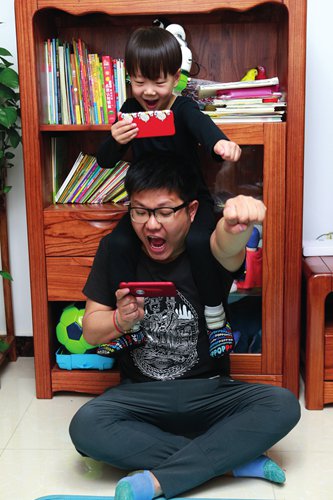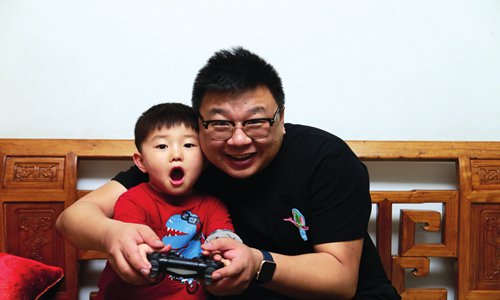METRO BEIJING / METRO BEIJING
Chinese parents in their mid-20s and 30s increasingly play computer and video games with their children

A father and son play video games together. Photo: Li Hao/GT
Li Qi, a 33-year-old IT worker living in Beijing, has a 7-year-old son, Fengfeng. They have a good bond, and he thinks they are "much closer" than other fathers and sons because they have a common interest, which is playing games.
They started playing together when Fengfeng was five. Li is a longtime player of World of Warcraft, and when he played, Fengfeng would watch.
"After I realized that he is interested in games, I decided to be his guide and companion in the world of games," Li said. "I thought it would be great fun, and I was right."
During the recent two sessions, Hu Wanning, a member of the National Committee of the Chinese People's Political Consultative Conference (CPPCC) and the head of Tangshan People's Hospital said that online games are "spirit drugs" and should be "banned and eliminated."
"We should control online games in the same way we control drugs, or they would harm the young generation," he said.
Another member of the CPPCC, Wang Jianguo also said games affected students' studies, citing the failure of the son of two of his friends to pass his middle school entrance examination. He said the child's parents graduated from Tsinghua and Peking University and suggested that the boy should have gotten good grades.
"I think the main reason is that the kid plays King of Glory too much," Wang said during the two sessions.
Their opinions triggered hot debate on Chinese social media with many young people, including many parents, saying that their opinions are absurd, obsolete and backward.
Ma Huateng, the CEO of Tencent, one of the biggest game producers in China, said on March 6 that not every game is evil, and parents should not only see the negative aspect of games.
Old gamer, young father
Li agrees with Ma. Recalling his childhood, Li said his parents were the typical Chinese parents who hate games and that his father would often beat him for playing games in game or internet bars.
"Every time my father would beat me for playing games, I would swear in my mind that I would be very understanding and never restrict my child from playing games, and I am doing so."
Li graduated from the department of computer science at Harbin Institute of Technology and now works in an internet company in Beijing. He just bought a new car, and last year, he moved into a larger house, which he bought with his own income and savings.
"I would sometimes talk with my parents, saying that I never stopped playing games, and I've got a good job, a beautiful wife and a lovely son," he said. "But guess what they say? They said if I didn't play games, I could have done better."
Li sees himself as among the first generation of gamers in China. Over the past 20 years, he has played almost every type of game available in China, including console games, handheld game consoles, arcade games, computer games and online games.
"I think the type of entertainment is created by the time, and people should accept it," he said. "In the internet and computer era, children play video games. But when my parents were children, they didn't have that. They would watch cockfights, play hide-and-seek and attend open-air cinemas whenever they were available in their village. We are all the same, but the time changes and technology advances."
Li said that games are a window through which children can learn about the world, just as they would through movies, cartoons and books. So, parents should not ban them from playing; instead, they should try to be a guide, help them select games and allow them to play for a limited time every day.
Fengfeng has his own iPad. He can choose games and apps from the App Store once a week, but he can only use his pocket money to buy them. In this way, Li also teaches his son how to manage his money.
"He has learned that money is needed in exchange for games and equipment, and he now has a basic concept of the value of money," Li said. "I often see some children max out their parents' bank cards playing games because they don't have any concept of money."
Fengfeng is a fan of the popular mobile game King of Glory, and he would like his father to buy heroes and skins for him. Li always uses such instances as a lesson to show his son what else the 168 yuan ($26.76) advanced skin in King of Glory can buy.
"When he gets excellent grades at school, I would ask him what prize he wants: the skin or a toy of the same price, or a delicious meal and a fun afternoon at a children's park," he said. "Most of the time he chooses tangible things."
Games and reality
Gao Mingbo, a 31-year-old sales manager, agrees with Li. He has a 4-year-old daughter, Nannan, who has shown great interest in computer games since she was a baby.
"She would stop crying whenever I played," Gao said. "Sometimes I think she is a born gamer with great talent."
Like Li, Gao is a longtime fan of World of Warcraft, and his daughter would often sit next to him and watch. Gao would tell her some simple stories from the game, and she gradually learned to find things and ask questions.
"She found that yellow lights symbolize safety and red lights danger. She learned that when some non-player characters (NPCs, any character that is not controlled by a player) are highlighted I can interact with them and that in some areas we can fly while in others we cannot. But the most interesting point is that she realized that the scenes, creatures, monsters, NPCs' clothes and even the weather in different areas of the game are different," he said. "Afterward, she began asking how and why, and I would tell her many stories to explain."
Gao and Li both agree that some games are not suitable for children. One of Li's favorite games on the PlayStation 4 home video game console is Grand Theft Auto V. He plays it late at night, and sometimes his son would see him play and criticize him for driving violently and ignoring pedestrians.
"I took great pains to explain to him that it's a game, and in the real world we cannot do anything illegal like we do in the game," he said. "I made it very clear that the game world and the real life are different and separated."
Gao said playing World of Warcraft while his daughter watches is the happiest time for him. It saves his energy compared with playing other things like hide-and-seek or building blocks, and he can share his favorite thing with the person he loves most.
"My father is now teaching me to play Minecraft, and I am very interested because it is great fun," she said.
Gao said he found that Nannan has a creative mind and always wants to build something on her own, so he recommended the game to her. "Parents should not be afraid to accept advanced entertainment tools and let their children learn something about it," he said.
Game ratings necessary
According to King of Glory's official website, over 200 million Chinese have registered to play the game, and players aged from 11 to 20 make up 54 percent of its users.
The mobile game market in China had a market volume of over 200 billion yuan by 2017, and 583 million people in China play at least one kind of mobile game. It has made China the biggest gaming market in the world, according to 2017 China Gaming Industry Report published in 2017.
Jack Jin, an amateur broadcaster on China's livestreaming platform douyu.com, has a 8-year-old son who plays Playerunknown's Battlegrounds quite well. Sometimes he lets his son livestream, and his son gets more viewers than him. Jin limits his son's gaming time to an hour a day to protect his eyes and make sure he studies. He is also a little concerned about whether the game is too violent for a child.
"On one hand, my son is very interested in the military and science. He learned the weapons in the game very fast, which has even helped him win a knowledge contest in school," Jin said.
"But sometimes he would hear other people say dirty and insulting words in the game, and although the blood is green, making the game more kid-friendly, some killing scenes are still too cruel for a child to see, much else do himself."
Jin is in a dilemma. According to him, if there were a clear rating system for every game in China, he and many parents would relax and worry less.
According to a March 13 report on news portal ifeng.com, a rating system has been in place from as early as 2004 when the China Youth Association for Network Development and Game Production Committee jointly launched the China green games rating and recommendation system. However, it was not implemented effectively.
In January 2017, the Office of the Central Leading Group for Cyberspace Affairs drafted regulations on internet protection for minors. The new regulations required online game service providers to take measures to prevent teenagers from playing unsuitable games, or accessing inappropriate elements in some games, and restrict their play time per day so that they cannot play online games between 12 am and 8 am.
However, many parents, including Jin, think that the system is not properly thought out and lacks specificity. The enforcement is also very weak, they said.
"I hope to see a clear and forceful game rating system in China like in the US and Japan," said Jin. "It can protect our children from the violent and erotic elements in some games and help the entire gaming industry advance and thrive, as a game rating system can give certain groups of players specific types of games."
Li said computer and video games could be considered as advanced toys for modern children.
"Some great games can be called works of art and can convey ideas that can influence people's character and abilities," he said. "So, parents don't be afraid of playing with your children, and make good use of games in parenting."

Unlike their parents before them, many young Chinese in their 20s and 30s embrace gaming as both a form of entertainment and an educational tool in parenting. Photo: Li Hao/GT
